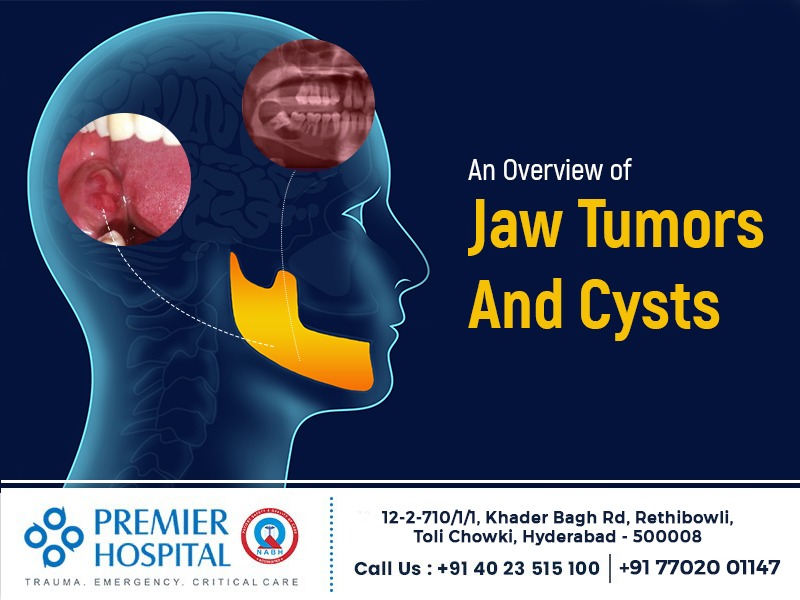An overview of Jaw Tumors and Cysts
by Premier Hospitals | April 9, 2022 |
Jaw tumors and cysts are rare lesions (growths) that form in the jawbone or in the soft tissues. Often these Jaw tumors and cysts are called odontogenic or non-odontogenic tumors based on the place they grow, and they can vary widely in size and severity. Usually, they are benign tumors, but sometimes they grow aggressively, dislodge, or destroy the bone, tissue, and teeth around them. The treatment for these jaw tumors and cysts depends on the type of lesion, the growth stage, and the symptoms. Oral and maxillofacial surgeons usually treat the tumor or cyst that develops in the jaw through surgeries, and some tumors can be handled by specific therapies or a combination of treatments. Tumors are masses of tissue that grow abnormally. Cysts are fluid-filled or semisolid lesions. A few common jaw tumors are: Ameloblastoma: This is a rare benign tumor that develops in the cells that form in the protective enamel layer under the teeth. Usually, it occurs near the molars in the jaw. The aggressive type tumors grow deep into the jawbone. It is possible for this tumor to recur even after treatment; however, aggressive surgery can often reduce the chances of recurrence. Central giant cell granuloma: These benign tumors grow out of bone cells that commonly develop in the lower jaw's front portion. These tumors are subdivided, and some types of tumors are aggressive, fast-growing, cause pain and damages bone. In contrast, other types are less aggressive. Sometimes, a tumor shrinks or resolves on its own, but in most cases, it requires surgery. Unfortunately, after surgery, aggressive tumors are likely to recur. Dentigerous cyst: This cyst develops in the tissues around a tooth before breaking through the gums into the mouth. These types of cysts most commonly affect the lower jaws. Usually, these cysts develop around unerupted wisdom teeth, although they may affect other teeth as well. Odontogenic keratocyst: This is often called a keratocystic odontogenic tumor since it recurs even after surgical treatment due to its tumorlike nature. Even though this cyst grows slowly, it can cause severe damage to the jaw and teeth if left untreated for a long time. These cysts commonly develop near the third molar in the lower jaw. In addition, these cysts can be seen in people who have nevoid basal cell carcinoma syndrome. Odontogenic myxoma. These type of benign tumor are rarely seen and grows slowly in the lower jaw. However, they can grow large and displace teeth by invading the lower jaw and the nearby tissues aggressively. Odontogenic myxomas frequently recur after surgery; however, aggressive surgical treatment can reduce the chances of tumor recurrence. Odontoma: This is the most common non-cancerous odontogenic tumor. Odontomas do not usually cause symptoms but can impede the eruption and development of teeth. This tumor is formed by a lump of tissue surrounding a tooth in the jaw. Often they look like oddly shaped teeth, but they can also be calcified tumors of any size. Genetic syndromes may be responsible for these tumors. Other types of cysts and tumors- Adenomatoid odontogenic tumor
- Aneurysmal bone cyst
- Glandular odontogenic cyst
- Calcifying epithelial odontogenic tumor
- Central odontogenic fibroma
- Calcifying odontogenic cyst
- Cementoblastoma
- Squamous odontogenic tumor
- Ossifying fibroma
- Osteoblastoma















